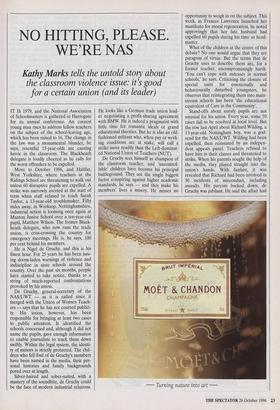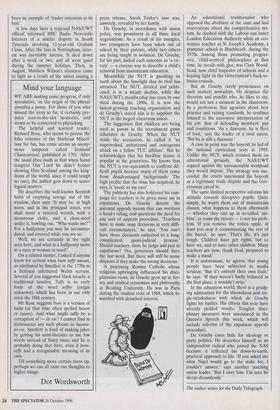NO HITTING, PLEASE.
WE'RE NAS
Kathy Marks tells the untold story about
the classroom violence issue: it's good for a certain union (and its leader)
IT IS 1979, and the National Association of Schoolmasters is gathered in Harrogate for its annual conference. An earnest young man rises to address fellow teachers on the subject of the school-leaving age, which has been raised to 16. The change in the law was a monumental blunder, he says; resentful 15-year-olds are causing havoc in the classroom. The Blackheath delegate is loudly cheered as he calls for the worst offenders to be expelled.
Move to October 1996, and Halifax, West Yorkshire, where teachers at the Ridings School are threatening to walk out unless 60 disruptive pupils are expelled. A strike was narrowly averted at the start of term when staff refused to teach Sarah Taylor, a 13-year-old troublemaker. Fifty miles away, in Worksop, Nottinghamshire, industrial action is looming once again at Manton Junior School over a ten-year-old pupil, Matthew Wilson. The former Black- heath delegate, who now runs the trade union, is criss-crossing the country for emergency meetings. He is, he says, 100 per cent behind his members.
He is Nigel de Gruchy, and this is his finest hour. For 25 years he has been issu- ing doom-laden warnings of violence and indiscipline in state schools around the country. Over the past six months, people have started to take notice, thanks to a string of much-reported confrontations provoked by his union.
De Gruchy, general-secretary of the NAS/UWT -- as it is called since it merged with the Union of Women Teach- ers — says that he has not courted publici- ty. His union, however, has been responsible for bringing at least two cases to public attention. It identified the schools concerned and, although it did not name the pupils, gave enough information to enable journalists to track them down swiftly. Within the legal system, the identi- ty of minors is strictly protected. The chil- dren who fell foul of de Gruchy's members have been named in the media, their per- sonal histories and family backgrounds pored over at length.
Silver-haired and sober-suited, with a mastery of the soundbite, de Gruchy could be the face of modern industrial relations. He looks like a German trade union lead- er negotiating a profit-sharing agreement with BMW. He is indeed a pragmatist with little time for romantic ideals or grand educational theories. But he is also an old- fashioned militant who, when pay or work- ing conditions are at stake, will call a strike more readily than the Left-dominat- ed National Union of Teachers (NUT). De Gruchy sees himself as champion of the classroom teacher, and 'uncontrol- lable' children have become his principal battleground. They are the single biggest factor conspiring against higher academic standards, he says — and they make his members' lives a misery. He misses no opportunity to weigh in on the subject. This week, as Frances Lawrence launched her manifesto for moral regeneration, he noted approvingly that her late husband had expelled 60 pupils during his time as head- master.
What of the children at the centre of this debate? No one would argue that they are paragons of virtue. But the terms that de Gruchy uses to describe them are, for a former teacher, uncompromisingly harsh. `You can't cope with nutcases in normal schools,' he says. Criticising the closure of special units for emotionally and behaviourally disturbed youngsters, he observes that reintegrating them into main- stream schools has been 'the educational equivalent of Care in the Community'.
Stand-offs about unruly pupils are not unusual for his union. Every year, some 50 cases fail to be resolved at local level. But the row last April about Richard Wilding, a 13-year-old Nottingham boy, was a god- send for the NAS/UWT. Wilding had been expelled, then reinstated by an indepen- dent appeals panel. Teachers refused to have him in their classes and threatened to strike. When his parents sought the help of the media, they played straight into the union's hands. With fanfare, it was revealed that Richard had been involved in 30 incidents of misconduct, including assaults. His parents backed down; de Gruchy was jubilant. He said the affair had been an example of 'trades unionism at its best'.
A few days later a regional NAS/UWT official informed BBC Radio Newcastle listeners of a similar dispute in South Tyneside involving 12-year-old Graham Cram. After the fuss in Nottingham, inter- est was inevitably intense. It died down after a week or two, and all went quiet during the summer holidays. Then, in August, Matthew Wilson's situation came to light as a result of the union issuing a press release. Sarah Taylor's case was, unwisely, revealed by her family.
De Gruchy, in accordance with union policy, was prominent in all these local negotiations. As a result of his energies, two youngsters have been taken out of school by their parents, while two others are being taught in isolation. De Gruchy, for his part, hailed each outcome as 'a vic- tory' — a curious way to describe a child's removal from mainstream education.
Meanwhile the NUT is gnashing its teeth about the limelight that its rival has attracted. The NUT, divided and politi- cised, is in a steady decline, while the NAS/UWT's membership has risen by one third during the 1990s. It is now the fastest-growing teaching organisation and de Gruchy's stated aim is to supplant the NUT as the largest classroom union.
The suggestion that children are being used as pawns in the recruitment game infuriates de Gruchy. When the NUT made the accusation, he called it 'an unprovoked, unfraternal and outrageous attack on a fellow TUC affiliate'. But he acknowledges that his hardline stance is popular at the grassroots. He knows that the NUT is too squeamish to confront dif- ficult pupils because many of them come from disadvantaged backgrounds. The high profile that the issue has acquired, he says, is 'music to my ears'.
The publicity has also bolstered his cam- paign for teachers to be given more say in expulsions. De Gruchy detests the parental appeals system that can overturn a head's ruling, and questions the need for any sort of appeals procedure. 'Teachers have to make snap decisions in very diffi- cult circumstances,' he says. 'You can't have those decisions subjected to a long, complicated, quasi-judicial process.' Should teachers, then, be judge and jury in expulsions? 'No, governors should have the last word. But there will still be some disputes if they make the wrong decisions.'
A practising Roman Catholic whose religious upbringing influenced his disci- plinarian views, de Gruchy grew up in Jer- sey and studied economics and philosophy at Reading University. He was in Paris during the student riots of 1968, which he watched with detached interest. An educational traditionalist who opposed the abolition of the cane and had reservations about the comprehensive sys- tem, he clashed with the Labour-run Inner London Education Authority while an eco- nomics teacher at St Joseph's Academy, a grammar school in Blackheath, during the 1970s. Among those promoting progres- sive, 'child-centred' philosophies at that time, he recalls with glee, was Chris Wood- head, now chief inspector of schools and a leading light in the Government's back-to- basics crusade.
But de Gruchy rarely pronounces on such matters nowadays. He despises the theorists and pundits who, he likes to say, would not last a moment in the classroom. In a profession that agonises about best practice and raising standards, he confines himself to the narrowest interpretation of his job: that of defending members' pay and conditions. 'As a dinosaur, he is fleet of foot,' says the leader of a rival union. `But he is still a dinosaur.'
A case in point was the boycott he led of the national curriculum tests in 1993. Unlike the NUT, which resisted them on educational grounds, the NAS/UWT argued against the unreasonable workload they would impose. The strategy was suc- cessful: the courts sanctioned the boycott as a legitimate trade dispute and the Gov- ernment caved in.
The same limited perspective informs his attitude towards disruptive pupils. Quite simply, he wants them out of mainstream classes; what happens to them afterwards — whether they end up in so-called 'sin- bins', or roam the streets — is not his prob- lem. 'If you remove the rotten apple, at least you stop it contaminating the rest of the barrel,' he says. 'That's life, it's just tough. Children have got rights, but so have we, and so have other children. Many teachers are now, thank God, prepared to make a stand.'
It is unfortunate, he agrees, that young people have been subjected to media scrutiny. 'But it's entirely their own fault,' he says. 'If they weren't badly behaved in the first place, it wouldn't arise.'
In the education world, there is a grudg- ing admiration for the shrewdness and sin- gle-mindedness with which de Gruchy fights his battles. His efforts this year have already yielded results. Tougher disci- plinary measures were announced in the Queen's Speech this week, which will include reforms of the expulsion appeals procedure.
De Gruchy cares little for ideology or party politics. He describes himself as an independent radical who joined the NAS because it reflected his down-to-earth, practical approach to life. 'If you asked me what Nigel would go to the stake for, I couldn't answer,' says another teaching union leader. Tut I envy him. I'm sure he sleeps dreamlessly.'
The author writes for the Daily Telegraph.



















































































 Previous page
Previous page